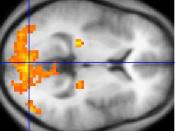Background
In today's society, many people find it quite important to "go with the flow" by conforming to what their friends, family members, and peers do in an attempt to obtain approval from them. Many studies have demonstrated the profound effect of group opinion on individual judgments, and there is no doubt that we look to the behavior and judgment of other for information about what will be considered expected and acceptable behavior. In fact, in a study published by Cell Press, Dr. Vasily Klucharev stated that "we often change out decisions and judgments to conform with normative group behavior. However, the neural mechanisms of social conformity remain unclear" (Source 1). Initially, Dr. Klucharev and his colleagues theorized that social conformity was based on reinforcement learning and that conflicting with ideas of a group compared with one's individual ideas could spark a "prediction error" signal. Prediction errors are differences "between expected and obtained outcomes that is thought to signal the need for a behavioral adjustment" (Source 1).
In simpler terms, their hypothesis stated that when one identifies that a group's beliefs or behaviors are different than their own, they feel the need to adjust to the ways of the group. To test this, the researchers used functional magnetic resonance imaging to examine brain activity in subjects whose initial judgments of facial attractiveness were open to influence by group opinion. They focused on examining the rostral cingulate zone (RCZ), which is believed to play a role in monitoring behavioral outcomes, and the nucleus accumbens (NAc), which has been seen as being implicated in the anticipation of rewards. The study found that "a conflict with the group opinion triggered a long-term conforming adjustment of an individuals' own rating and that conflict with the group elicited a neuronal response in the RCZ and...


